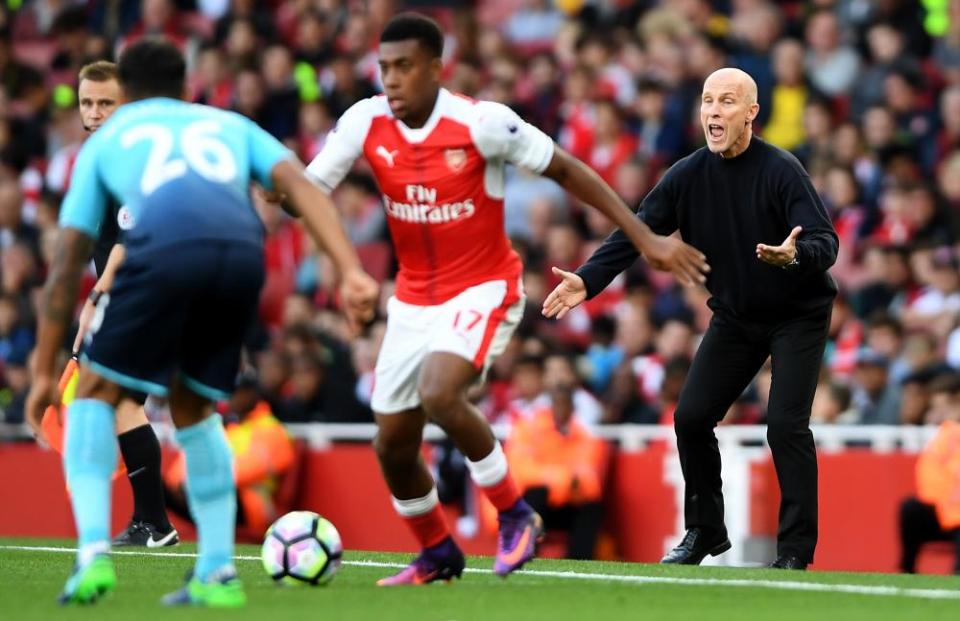Jesse Marsch must fight US stereotypes as well as relegation at Leeds
The jokes about Bob Bradley lasted longer than he did as Swansea City manager. Sky Sports’ Soccer AM ran a sketch for years after the American had departed the Liberty Stadium mocking how he talked about football. Brad Bobley, as the character was dubbed, spoke in a Stateside twang about “scoop-de-loop volleys” and “megnuts” and “midfield stripes”. Bradley’s mistake was once calling a penalty kick a “PK” in a press conference.
The jokes made at Bradley’s expense were all good fun, but his chastening experience in Wales highlighted the outdated prejudices still held against American coaches in British football. This is the environment Jesse Marsch has entered as the new manager of Leeds United.
Related: ‘My respect for Bielsa is massive’: Jesse Marsch named as new manager of Leeds
Marsch, who worked as an assistant to Bradley for the US national team, arrives at Elland Road having proved himself at a high level on the continent. He was sacked by RB Leipzig only three months ago, but the 48-year-old had built an impressive body of work at Red Bull Salzburg where he won back-to-back league and cup doubles using an energetic, dynamic style of play.
Marsch has the makings of a good successor to Marcelo Bielsa. The American has inherited a Leeds squad that should be able to quickly absorb his ideas. Like Bielsa, Marsch favours a ball-orientated, aggressive style that should have fans on the edge of their seats. His teams are renowned for their fluidity and vertical movement. Bielsa-ball will still live on in some form.
The biggest change could be the one from a man-marking system to a zonal one but Leeds need a different approach on defence, having conceded more goals (60) than any other side in the Premier League this season. It could be a good fit.
And yet the same old tropes Bradley faced more than five years ago are being rolled out again. “You appoint someone called Jesse Marsch who pretty much knows nothing about the Premier League, he’s not worked in it, he’s not plied his trade in it, and you ask him to come in and rescue this team,” said Andy Gray, of former Sky Sports fame now working for beIN Sports, in his blunt assessment of Marsch’s suitability for his new role.
Gray never referenced Marsch’s nationality, but the implication was there – how successful can an American coach really be in the Premier League when it isn’t their league or even their sport? Successful or not at Leeds United, Marsch will have to handle such ignorance as only the second American to have managed in the English top flight.
American players have largely shaken off the stigma they carried for decades. The likes of Christian Pulisic, Weston McKennie, Gio Reyna and others have encouraged European clubs to consider a previously untapped talent pool more closely. Transfer traffic from the United States to the ‘Big Five’ leagues is heavier than ever before – January saw countless Americans leave MLS for Europe.
However, US football is still waiting for a manager to forge a similar path for coaches. Marsch could be that figure, but there were similar hopes for Bradley, who had earned his Premier League opportunity after successful spells in a number of different countries.

Of course, Bradley’s short time at Swansea City was catastrophic. He won just two of his 11 matches in charge, his team conceded 29 times in the process and he did nothing to change the course of a club heading for relegation. Unfairly, Bradley’s abject failure made it even harder for an American coach to make a breakthrough in the Premier League. Old prejudices linger – see how Chris Armas has reportedly been nicknamed ‘Ted Lasso’ by Manchester United’s players.
Leeds United, however, could be the perfect destination for Marsch despite their current predicament. The Elland Road hierarchy thought outside the box when they appointed Bielsa four years ago and they have done so again by hiring Marsch. It would have been very easy to give Sam Allardyce a call, as many relegation-threatened clubs have over the years. Instead, Leeds have shown more imagination.
Ambition, too. It was only last summer that Marsch was deemed a strong enough candidate to take over from Julian Nagelsmann, arguably the best young coach in Europe, at RB Leipzig, a Champions League club with lofty ambitions. In Germany, where Americans have played and coached for years, Marsch’s nationality was barely a factor. He failed at RB Leipzig, but not because he spoke about “PKs”.
And not because he’s a bad manager either. Reports at the time of Marsch’s exit from RB Leipzig claimed he had been the victim of a disagreement over philosophy at boardroom level. While the Bundesliga club wanted to play one way, Marsch wanted to play another. The misstep was on RB Leipzig’s part as much as it was on Marsch’s.
If Leeds and Marsch are on the same page, their union may just produce results. If results go well, his nationality will be an afterthought in a way Bradley’s never was. Whether he likes it or not, Marsch hasn’t just been charged with turning Leeds United’s season around. The reputation of his US peers is riding on his success too.

